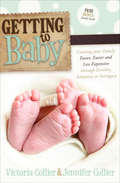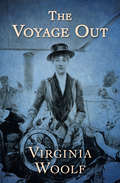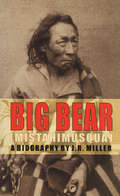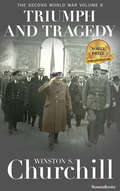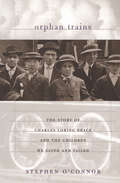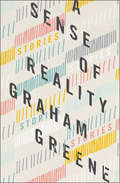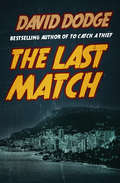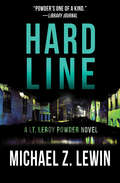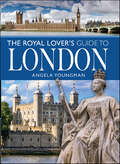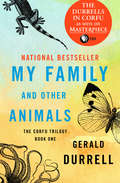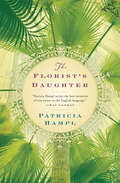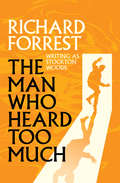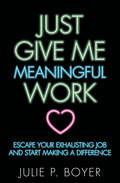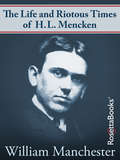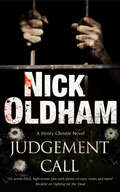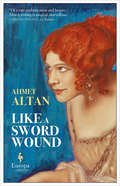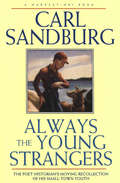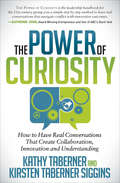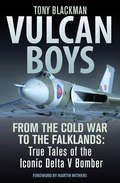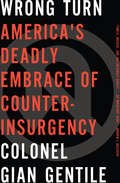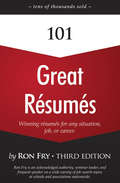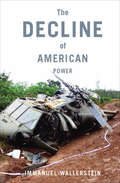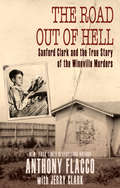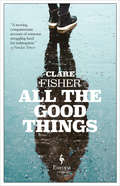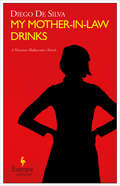- Table View
- List View
Getting to Baby: Creating your Family Faster, Easier and Less Expensive through Fertility, Adoption, or Surrogacy
by Victoria Collier Jennifer CollierTHE guidebook for creating a perfect family in a non-perfect world—from budgeting and caregiving issues to managing the emotional highs and lows. Creating a family in the twenty-first century presents certain challenges: career couples are waiting longer and discovering infertility issues, and gay and lesbian couples are becoming parents through various methods. The authors share their five-year story, struggles, and success of creating a family. This book is designed to aide others who are going through the process of creating a child through alternative means, with a specific intent of providing shortcuts in time, emotions, and money. &“Shares the personal experiences of Victoria and Jennifer . . . a must read for anyone experiencing challenges in creating their family.&” —James B. Outman, Fellow of the American Academy of Adoption Attorneys
The Voyage Out: Large Print (Oxford World's Classics)
by Virginia Woolf&“As poignant as anything in modern fiction&”: An English girl comes of age on a journey to South America in this debut novel by the author of Mrs. Dalloway (E. M. Forster). Aboard her father&’s cargo ship, young Rachel Vinrace meets Helen and Ridley Ambrose, her aunt and uncle, who invite her to join them at a South American resort for the winter. Shy and introspective, Rachel tentatively agrees, and soon finds herself on a voyage of liberation and self-discovery as she experiences the excitement and calamity of young love. With an appearance by Clarissa Dalloway—and a fateful encounter between her husband and Rachel—Virginia Woolf&’s debut novel anticipates the groundbreaking brilliance of her later works while displaying all their wit, insight, and heartbreaking sensitivity. &“For all its tragic interest, The Voyage Out is not low-keyed; it even has a slight buoyancy of tone, as if clear perception itself brought a continual zest to its writer. Woolf has the diversity of power which makes the great writer of narrative.&” —New Republic This ebook has been professionally proofread to ensure accuracy and readability on all devices.
Big Bear: A Biography (Canadian Biography Ser.)
by J.R. MillerA biography of the Plains Cree chief who challenged Canadian authorities and became a warrior of legend. When Big Bear was young, in the first half of the nineteenth century, he overcame smallpox and other hardships—and eventually followed in the footsteps of his father, Black Powder, engaging in warfare against the Blackfoot. The time would come for him to draw on these experiences and step into a leadership role, as the buffalo began to disappear and his people suffered. This rich historical biography tells of Big Bear&’s role as chief of a Plains Cree community in western Canada in the late nineteenth century, at a time of transition between the height of Plains Indian culture and the modern era. During the 1870s and early 1880s, Big Bear became the focal point of opposition for Cree and Saulteaux bands that did not wish to make treaty with Canada. During the early 1880s, he spearheaded a Plains diplomatic movement to renegotiate the treaties in favor of the Aboriginal groups whose way of life had been devastated. Although Big Bear personally favored peaceful protest, violent acts by some of his followers during the North-West Rebellion of 1885 provided the federal government with the opportunity to crush him by prosecuting him for treason. His story provides fascinating insight into this era of North American history.
Triumph and Tragedy: Triumph And Tragedy (Winston S. Churchill The Second World Wa #6)
by Winston S. ChurchillWinston Churchill recounts the end of WWII and its aftermath, in the conclusion of his majestic six-volume history. In Triumph and Tragedy, British prime minister Winston Churchill provides in dramatic detail the endgame of the war and the uneasy meetings between himself, Stalin, and Truman to discuss plans for rebuilding Europe in the aftermath of devastation. Beginning with the invasion of Normandy, the heroic landing of the Allied armies and the most remarkable amphibious operation in military history, Churchill watches as the uneasy coalition that had knit itself together begins to fray at Potsdam, foreshadowing the birth of the Cold War. Triumph and Tragedy is part of the epic six-volume account of World War II told from the viewpoint of a man who led in the fight against tyranny, and enriched with extensive primary sources including memos, letters, orders, speeches, and telegrams, day-by-day accounts of reactions as the drama intensifies. Throughout these volumes, we listen as strategies and counterstrategies unfold in response to Hitler&’s conquest of Europe, planned invasion of England, and assault on Russia, in a mesmerizing account of the crucial decisions made as the fate of the world hangs in the balance.
Orphan Trains: The Story of Charles Loring Brace and the Children He Saved and Failed
by Stephen O'ConnorThe true story behind Christina Baker Kline&’s bestselling novel is revealed in this &“engaging and thoughtful history&” of the Children&’s Aid Society (Los Angeles Times). A powerful blend of history, biography, and adventure, Orphan Trains fills a grievous gap in the American story. Tracing the evolution of the Children&’s Aid Society, this dramatic narrative tells the fascinating tale of one of the most famous—and sometimes infamous—child welfare programs: the orphan trains, which spirited away some two hundred fifty thousand abandoned children into the homes of rural families in the Midwest. In mid-nineteenth-century New York, vagrant children, whether orphans or runaways, filled the streets. The city&’s solution for years had been to sweep these children into prisons or almshouses. But a young minister named Charles Loring Brace took a different tack. With the creation of the Children&’s Aid Society in 1853, he provided homeless youngsters with shelter, education, and, for many, a new family out west. The family matching process was haphazard, to say the least: at town meetings, farming families took their pick of the orphan train riders. Some children, such as James Brady, who became governor of Alaska, found loving homes, while others, such as Charley Miller, who shot two boys on a train in Wyoming, saw no end to their misery. Complete with extraordinary photographs and deeply moving stories, Orphan Trains gives invaluable insights into a creative genius whose pioneering, if controversial, efforts inform child rescue work today.
A Sense of Reality: Stories
by Graham GreeneWith his &“sheer mastery of narrative,&” the British novelist takes a detour into the uncanny and wondrously absurd in these &“compelling&” stories (The Guardian). An ambitious departure for an author renowned for his realism, this collection of short fiction &“collectively . . . [engages] in a reconnaissance through the dustier reaches of man&’s experience with [the] spectres of doubt, defeat, failure and paradox&” (Kirkus Reviews). In &“Under the Garden,&” William Wilditch, a restless loner given to wanderlust, takes one final journey as he approaches death—back to his childhood home where he discovers that the memories of his youth are simply not to be believed. In &“A Visit to Morin,&” an admirer and old friend of a once-renowned Catholic writer is unprepared for the startling confessions of the spiritually bereft, now-reclusive scribe. On a vast plantation, a peculiar wish is granted a poor leper by his physician-in-charge—and for one rowdy winter night, a &“Dream of a Strange Land&” becomes a reality. Finally, for a group of children scouting the apocalyptic ruins at the edge of their village, &“A Discovery in the Woods&” opens their eyes to a lost world they never knew existed. With these versatile forays into myth, memory, magic realism, and dystopian futures, Greene once again proves himself &“a storyteller of genius&” (Evelyn Waugh).
The Last Match (Hard Case Crime Ser.)
by David DodgeThis witty novel of a con man on the run, from the author of To Catch a Thief, &“ends with a gratifying twist&” (Publishers Weekly). When a handsome swindler working the French Riviera meets a beautiful heiress on the beach at Cannes, sparks fly. But so do bullets—and soon he&’s forced to flee the country with both the police and the heiress on his trail. From the casinos of Monaco to the jungles of Brazil, from Tangier to Marrakech to Peru, the chase is on. And not even a veteran of Monte Carlo&’s baccarat tables would dare to place odds on where it will end . . . &“A master hand at dangers and hair-raising near misses.&” —San Francisco Chronicle &“The pulp era may have been over, but Dodge was still writing like it was in full swing, peppering the story with snappy patter. . . . Great fun.&” —Booklist
Hard Line: A Lt Leroy Powder Novel (The Lt. Leroy Powder Novels #2)
by Michael Z. LewinThe Edgar Award–nominated author of the Albert Samson mysteries returns with &“another first-rate, fast-moving police procedural&” featuring Lt. Leroy Powder (Publishers Weekly). Nineteen years in Night Cover for the Indianapolis PD and suddenly Lt. Leroy Powder gets a new job description. The surly cop may have honed his instincts for solving crimes, but he can&’t tell if heading the Missing Persons Bureau is a promotion, demotion, or something in between. And then he gets a new partner thrown at him. Sure, Sgt. Carollee Fleetwood is a decorated cop who took a bullet for a fellow officer, but all Lieutenant Powder sees is a woman rolling around in a wheelchair. And there&’s no time to be sensitive and diplomatic when there&’s a job to be done. As Powder and Fleetwood test each other, they never lose sight of the case at hand—no matter how strange the details. Case by case, from missing loves to missing lovers, the two seasoned detectives slowly gain each other&’s grudging respect. And no matter how vicious the jokes get, neither will ever crack a smile. Hard Line is the 2nd book in the Lt. Leroy Powder Novels, but you may enjoy reading the series in any order.
The Royal Lover's Guide to London
by Angela YoungmanLondon and the Royal Family are inextricably intertwined. Generations of monarchs have been crowned, married and buried there. Linking Hampton Court Palace to Greenwich is a royal river, which in turn has been used for royal celebrations and progresses as well as a route to imprisonment and execution. In the current century, London became a focus of Royal Jubilees. Wherever you go within London there are places and scenes linked to past and present royalty. Thousands of people come every year to see the stunning places associated with the Royal Family, to watch spectacular ceremonies like Changing of the Guard, The Trooping of the color, or simply to explore the history and heritage of Royal London. Royal London highlights everything from Westminster Abbey, the site of coronations and weddings to the Victoria & Albert Museum and Horse Guards Parade. Take a look at royal palaces such as Buckingham Palace, Kensington Palace and Kew Palace. Discover amazing stories at the Tower of London. Discover where the Duchess of Cambridge danced with Paddington Bear, where the Duke and Duchess of Cambridge together with Prince Harry duelled with wands, the bakery popular with Meghan, Duchess of Suffolk, an apothecaries garden of which the Prince of Wales is patron and some of Princess Eugenie’s artistic venues. Take a trip to RAF Hendon and see the helicopter piloted by the Duke of Cambridge while serving with the RAF Search & Rescue or explore the football grounds supported by royal princes. Shop in the stores that are used by Royalty. Discover London from a royal perspective exploring the shops, places and venues linked to modern royalty.
My Family and Other Animals (The Corfu Trilogy #1)
by Gerald DurrellThe inspiration for The Durrells in Corfu, a Masterpiece production on public television: A naturalist&’s account of his childhood on the exotic Greek island. When the Durrells could no longer endure the gray English climate, they did what any sensible family would do: sold their house and relocated to the sun-soaked island of Corfu. As they settled into their new home, hilarious mishaps ensued as a ten-year-old Gerald Durrell pursued his interest in natural history and explored the island&’s fauna. Soon, toads and tortoises, bats and butterflies—as well as scorpions, geckos, ladybugs, praying mantises, octopuses, pigeons, and gulls—became a common sight in the Durrell villa. Uproarious tales of the island&’s animals and Durrell&’s fond reflections on his family bring this delightful memoir to life. Capturing the joyous chaos of growing up in an unconventional household, My Family and Other Animals will transport you to a place you won&’t want to leave. This ebook features an illustrated biography of Gerald Durrell including rare photos from the author&’s estate.
The Florist's Daughter
by Patricia HamplThis New York Times Notable memoir of a middle-class, middle-America family is a &“beautiful bouquet of a book&” (Entertainment Weekly). They say &“a daughter is a daughter all her life,&” and no statement could be truer for Patricia Hampl. Born to a Czech father—an artistic florist—and a wary Irish mother, Hampl experienced a childhood in St. Paul, Minnesota, that couldn&’t have been more normal, the perfect example of a twentieth century middle-class, middle-American upbringing. But as she faces the death of her mother, Hampl reflects on the struggles her parents went through to provide that normal, boring existence, and her own struggles with fulfilling the role of dutiful daughter as she grew through the postwar years to the turbulent sixties and couldn&’t help wanting to rebel against the notion of a &“relentlessly modest life.&” Named a Chicago Tribune Best Book of the Year, The Florist&’s Daughter is Hampl&’s most extraordinary work to date—a &“quietly stunning&” reminiscence of a Midwestern girlhood, and a reflection on what it means to be a daughter (People).
The Man Who Heard Too Much
by Richard ForrestWhen a mentally challenged man in possession of deadly secrets is targeted by an assassin, he must fight to survive, in this chilling espionage thriller. Martin Fowler is a determined twenty-eight-year-old who hasn&’t let his mental handicap hold him back. He has a job at a service station, a bed in a halfway house, and a real shot at leading a normal life. He&’s a kind man who&’s never done anyone harm, but for reasons beyond his control, he&’s been marked for death. Corrupt Washington senator Rutledge Galatin Baxter believes Martin knows a secret about him, and the politician will kill to keep it safe. He dispatches his lover, expert assassin Althea Remington, to end Martin&’s life. The first attempt fails, but Althea won&’t stop until she succeeds. Martin may be innocent, but to survive, he&’ll have to learn to understand the nature of evil. And with the help of the director of his halfway house, Martin will do something he never thought he would have to do: stand and fight—or die. In the spirit of classic conspiracy thriller Six Days of the Condor, this is a story of a man on the run from sinister forces he can&’t understand. Its hero is someone never before seen in a spy novel, making The Man Who Heard Too Much one of the most unique espionage thrillers in history.
Just Give Me Meaningful Work: Escape Your Exhausting Job and Start Making a Difference
by Julie P. BoyerStart living the life you were meant to lead with this indispensable guide to getting unstuck and creating a meaningful career. Afraid of letting another year go by in a job that drains the life out of you? What if you had a clear vision for work that would tap your natural strengths, allow you to be yourself, and make a difference in the world? Just Give Me Meaningful Work helps those who are stuck in the wrong job break free, find their calling, and finally feel great about themselves. Certified co-active coach Julie P. Boyer helps readers see what's blocking their path to successful change. Her tools have helped numerous people land their dream job, negotiate a better title at work, or even start their own business. Just Give Me Meaningful Work shows you how your current frustrations can reveal your true purpose. It helps readers get off the hamster wheel and move forward with focus and confidence. Boyer guides readers towards getting their energy and optimism back and feeling alive and inspired once again.
The Life and Riotous Times of H.L. Mencken
by William Manchester&“Written with verve, intellectual sophistication, and a prickly wit worthy of its eminent subject. . . . A first-class piece of literate entertainment&” (The New Yorker). Before he went on to become a celebrated biographer and historian, renowned for such works as A World Lit Only by Fire, American Caesar, and The Last Lion, William Manchester worked as a reporter for the Baltimore Sun in the 1940s—and it was there that he met fellow journalist H. L. Mencken. This book tells the story of conservative, anarchist H. L. Mencken&’s life in compelling, intimate detail—and offers a uniquely personal look at the influential cultural critic and satirist who cofounded the magazines the American Mercury and the Smart Set and became a legend for his sharp and highly quotable wit.
Judgement Call (The Henry Christie Mysteries #20)
by Nick OldhamIn this 1980s-set prequel to the popular Henry Christie mysteries, the rookie Lancashire cop is out to prove himself in ways that nearly get him killed. It&’s 1982, and twenty-three-year-old Henry Christie is determined to make detective in record time. His brief transfer to the Blackburn Criminal Investigation Department ended in disaster. Now he&’s back in uniform, patrolling the quiet streets of Rossendale Valley, and dreaming up a way to make it back to the CID. He needs to make his mark. And he&’s about to learn how dangerous ambition can be. Disobeying orders at the scene of a bank robbery gets Henry shot at, and a burglar escapes on his watch. His impetuous actions put him—and his fellow officers—in harm&’s way. But when a fellow constable is shot down, Henry hunts down her killers with a new sense of resolve in this gritty procedural from the author of Bad Tidings. &“A number of twists in the plot will catch even longtime series fans by surprise.&” —Publishers Weekly
Like a Sword Wound (Ottoman Quartet #1)
by Ahmet AltanA “magical, marvellous” epic of an empire in collapse: Book one in the acclaimed Ottoman Quartet by the award-winning Turkish author and political dissident (La Stampa, Italy).Tracking the decline and fall of the Ottoman empire, Ahmet Altan’s Ottoman Quartet spans fifty years from the end of the nineteenth century to the post-WWI rise of Atatu¨rk as leader of the new Turkey. In Like a Sword Wound, a modern-day resident of Istanbul is visited by the ghosts of his ancestors, finally free to tell their stories “under the broad, dark wings of death.”Among the characters who come to life are an Ottoman army officer; the Sultan’s personal doctor; a scion of the royal house whose Western education brings him into conflict with his family’s legacy; and a beguiling Turkish aristocrat who, while fond of her emancipated life in Paris, finds herself drawn to a conservative Muslim spiritual leader. As their stories of intimate desire and personal betrayal unfold, the society that spawned them is transforming and the sublime empire disintegrating.Here is a Turkish saga reminiscent of War and Peace, written in lively, contemporary prose that traces not only the social currents of the time but also the erotic and emotional lives of its characters.“An engrossing novel of obsessive love and oppressive tyranny, a tale of collapse that dramatizes the fateful moments of an empire and its subjects.” —Publishers Weekly (starred review)
Always the Young Strangers: The Poet Historians Moving Recollection of His Small Town Youth
by Carl SandburgThe Pulitzer Prize–winning poet and historian recalls his midwestern boyhood in this classic memoir. Born in a tiny cottage in Galesburg, Illinois, in 1878, Carl Sandburg grew with America. As a boy he left school at the age of thirteen to embark on a life of work—driving a milk wagon and serving as a hotel porter, a bricklayer, and a farm laborer before eventually finding his place in the world of literature. In Always the Young Strangers, Sandburg delivers a nostalgic view of small-town life around the turn of the twentieth century and an invaluable perspective on American history.
The Power of Curiosity: How to Have Real Conversations That Create Collaboration, Innovation and Understanding
by Kathy Taberner Kirsten Taberner SigginsUse the power of curiosity to transform challenging conversations into productive, meaningful, relationship-building experiences at work, home, or school. As leaders, parents, or teachers, navigating difficult conversations is part of the job. How do we keep calm and achieve a productive outcome, all while keeping our relationships intact? The secret is curiosity. Curiosity is the innovation-driving, emotion-calming skill that comes so naturally to us as children, but gets so easily buried beneath our busy, multitasking lifestyles. The good news is that we simply have to relearn what we already know! In The Power of Curiosity, mother-daughter executive coaching team Kathy Taberner and Kirsten Taberner-Siggins walk you through the Curiosity Skills and introduce a step-by-step process to use anytime—but especially when challenging conversations arise. In The Power of Curiosity you&’ll learn: How to be fully present in every conversation, even when distractions aboundThe five listening choices you always have available at home, work, or schoolSpecific calming strategies to access when negative emotions run high A step-by-step process to transform potential conflict into relationship-building opportunities.
Vulcan Boys: From the Cold War to the Falklands: True Tales of the Iconic Delta V Bomber (The\jet Age Ser. #6)
by Tony BlackmanAn in-depth look at these Cold War–era bombers, in the words of those who flew them—includes photos. The Vulcan, the second of the three V bombers built to guard the United Kingdom during the Cold War, has become an aviation icon like the Spitfire, its delta shape as instantly recognizable as the howling noise it makes when the engines are opened for takeoff. Vulcan Boys is the first book about this bomber recounted completely firsthand by the operators themselves. It tells the story of the aircraft from its design conception through the Cold War, when it played out its most important job as Britain&’s nuclear deterrent; it also reveals the significant role its bombs and missiles played in liberating the Falkland Islands, for which it gained much celebrity. These individual accounts detail how hours at a time were spent waiting to be scrambled to defend the country in the event of a third world war, and how pilots&’ aggressive skills were honed by carrying out Lone Ranger sorties flying to the United States and westward around the world, and taking part in Giant Voice and Red Flag, competitive exercises against the US Strategic Air Command. The attacks in the Falklands using Shrike missiles are described accurately and in great detail for the first time, including the landing at Rio de Janeiro alongside a vivid account of Black Buck 2. Vulcan Boys is a fascinating and completely authentic read reminding us of the Cold War, how it was fought, and the considerable effort required to prevent all-out nuclear war.
Wrong Turn: America's Deadly Embrace of Counter-Insurgency
by Colonel Gian GentileA searing indictment of US strategy in Afghanistan from a distinguished military leader and West Point military historian—&“A remarkable book&” (National Review). In 2008, Col. Gian Gentile exposed a growing rift among military intellectuals with an article titled &“Misreading the Surge Threatens U.S. Army&’s Conventional Capabilities,&” that appeared in World Politics Review. While the years of US strategy in Afghanistan had been dominated by the doctrine of counterinsurgency (COIN), Gentile and a small group of dissident officers and defense analysts began to question the necessity and efficacy of COIN—essentially armed nation-building—in achieving the United States&’ limited core policy objective in Afghanistan: the destruction of Al Qaeda. Drawing both on the author&’s experiences as a combat battalion commander in the Iraq War and his research into the application of counterinsurgency in a variety of historical contexts, Wrong Turn is a brilliant summation of Gentile&’s views of the failures of COIN, as well as a trenchant reevaluation of US operations in Afghanistan. &“Gentile is convinced that Obama&’s &‘surge&’ in Afghanistan can&’t work. . . . And, if Afghanistan doesn&’t turn around soon, the Democrats . . . who have come to embrace the Petraeus-Nagl view of modern warfare . . . may find themselves wondering whether it&’s time to go back to the drawing board.&” —The New Republic
101 Great Résumés: Winning Resumes For Any Situation, Any Job, Any Career
by Ron FryStart your job search right with the perfect résumé to showcase your experience and land your dream job. In 101 Great Résumés, you will find the résumé format that will work wonders for you, one that can showcase your unique background, situation, and career goals and help you land your dream job. It features résumés tailored to the individual situations, challenges, and aspirations of today&’s job seekers.
The Decline of American Power: The U. S. In A Chaotic World
by Immanuel WallersteinThe internationally renowned theorist contends that the sun is setting on the American empire in this &“lucid, informed, and insightful&” account (The New York Times). The United States currently finds itself [a] superpower that lacks true power, a world leader nobody follows and few respect, and a nation drifting dangerously amidst a global chaos it cannot control. The United States in decline? Its admirers and detractors alike claim the opposite: America is now in a position of unprecedented global supremacy. But in fact, Immanuel Wallerstein argues, a more nuanced evaluation of recent history reveals that America has been fading as a global power since the end of the Vietnam War, and its response to the terrorist attacks of 9/11 looks certain to hasten that decline. In this provocative collection, the visionary originator of world-systems analysis and the most innovative social scientist of his generation turns a practiced analytical eye to the turbulent beginnings of the twenty-first century. Touching on globalization, Islam, racism, democracy, intellectuals, and the state of the left wing, Wallerstein upends conventional wisdom to produce a clear-eyed—and troubling—assessment of the crumbling international order. &“[Wallerstein&’s thought] provides a new framework for the subject of European history . . . it is compelling, a new explanation, a new classification, indeed a revolutionary one, of received knowledge and current thought.&” —Fernand Braudel
The Road Out of Hell: Sanford Clark and the True Story of the Wineville Murders
by Anthony Flacco Jerry ClarkThe New York Times–bestselling author&’s &“haunting, compassionate, and terrifyingly true&” story of a man breaking free from his notorious past (Gregg Olson, New York Times–bestselling author of Starvation Heights). From 1926 to 1928, Gordon Stewart Northcott committed at least twenty murders on a chicken ranch outside of Los Angeles. He held his nephew, Sanford Clark, captive there from the age of thirteen to fifteen. Sanford would be Northcott&’s sole surviving victim. Forced by Northcott to take part in the murders, he carried tremendous guilt all his life. Yet despite his youth and the trauma he endured, Sanford helped gain justice for the dead and their families by testifying at the trial that led to Northcott&’s execution. These shocking events inspired Clint Eastwood&’s film The Changeling. But in The Road Out of Hell, acclaimed crime writer Anthony Flacco uses revelatory new accounts from Sanford&’s son to tell the complete, true story. Going beyond the film&’s narrative, Flacco recounts not only Sanford&’s nightmarish captivity, but also the inspiring life he led afterward. In dramatizing one of the darkest cases in American crime, Flacco constructs a riveting psychological drama about how Sanford was able to detoxify himself from the evil he&’d encountered, offering the ultimately redemptive story of one man&’s remarkable ability to survive hell on earth and emerge intact.
All the Good Things
by Clare FisherThe Betty Trask Award winner: A young female convict recounts her life to discover the good in it, and in herself, in this &“moving, compassionate&” novel (The Sunday Times). Twenty-one-year-old Beth has done plenty of good, grown-up sorts of things—including having a baby. But she&’s also done something bad enough to land her in prison. At the urging of her counselor, she begins to make a list of all the good things that have happened to her. It&’s difficult at first, as she was abandoned by her mother and shuffled from one foster home to another. Hers is a life that veered from a brilliantly artistic childhood to rough boyfriends and thankless jobs. As she writes, however, she begins to understand that every life has moments of peace, friendship, and triumph. From sharing silence with someone she loves, to feeling so happy it hurts, she begins to see her life—and herself—anew. But Beth must also acknowledge the act that sent her to jail, and confront the question: Is there a chance for her redemption?
My Mother-in-Law Drinks (The Vincenzo Malinconico Novels #2)
by Diego De SilvaA hapless Italian lawyer is wrapped up in the mock trial of a mafia boss in this &“rollicking novel&”—a &“hilarious and touching&” satire of the digital age (Minneapolis Star-Tribune). A mild-mannered computer engineer has pulled off a seemingly impossible crime—kidnapping the Neapolitan mafia boss he believes is responsible for the death of his son. He plans to conduct an impromptu trial on live television during which he will list the various crimes of the accused, sentencing him before a captivated national audience and executing him accordingly. The standoff between law enforcement officers and the kidnapper quickly escalates into a tragi-comic reality show. The only hope of a happy ending rests with Vincenzio Malinconico, Neapolitan lawyer and walking mid-life crisis. Vincenzio hardly has a reputation for decisiveness, but now is called upon to resolve this drama with, hopefully, no loss of life—especially his own. In this hilarious sequel to his Naples Prize–winning novel I Hadn&’t Understood, Diego De Silva revisits the hapless yet charismatic Vincenzo Malinconico—&“the sort of man you marry twice, and leave both times.&”
